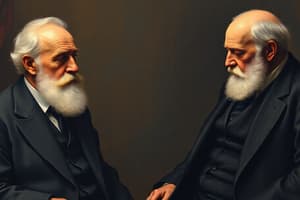Podcast
Questions and Answers
What is the one dynamic force behind people's behavior according to Adlerian theory?
What is the one dynamic force behind people's behavior according to Adlerian theory?
- Desire for material wealth
- Pleasure seeking
- Striving for success or superiority (correct)
- Fear of failure
What shapes people's behavior and personality according to Adler?
What shapes people's behavior and personality according to Adler?
- Subjective perceptions (correct)
- Objective reality
- Unconscious desires
- Social expectations
What is the main concept that Adlerian theory emphasizes in human relations?
What is the main concept that Adlerian theory emphasizes in human relations?
- Individualism
- Isolation
- Social equality (correct)
- Competition
What does Adler refer to as the self-consistent personality structure developing into a person's style of life?
What does Adler refer to as the self-consistent personality structure developing into a person's style of life?
According to Adler, what is the 'Final Goal' that individuals strive for?
According to Adler, what is the 'Final Goal' that individuals strive for?
What feeling within individuals did Adler heavily rely on in his theory?
What feeling within individuals did Adler heavily rely on in his theory?
At what age does a person's Creative Power reach its full capacity?
At what age does a person's Creative Power reach its full capacity?
What is the main motivation for people striving for superiority or success according to the text?
What is the main motivation for people striving for superiority or success according to the text?
What is the concept of Fictionalism as mentioned in the text?
What is the concept of Fictionalism as mentioned in the text?
What is the term used to describe the specialized language or communication system within a particular organ or system of the body?
What is the term used to describe the specialized language or communication system within a particular organ or system of the body?
What is the natural condition of the human species that binds society together?
What is the natural condition of the human species that binds society together?
How does a person's Style of Life develop according to the text?
How does a person's Style of Life develop according to the text?
Flashcards
Individual Psychology
Individual Psychology
Optimistic view of people, emphasizing social interest, founded by Alfred Adler.
Striving for Success/Superiority
Striving for Success/Superiority
Core driving force in behavior; overcoming feelings of inferiority.
Subjective Perceptions
Subjective Perceptions
People's actions based on their personal interpretations, not objective reality.
Social Interest
Social Interest
Signup and view all the flashcards
Style of Life
Style of Life
Signup and view all the flashcards
Creative Power
Creative Power
Signup and view all the flashcards
Inferiority Feelings
Inferiority Feelings
Signup and view all the flashcards
Fictionalism
Fictionalism
Signup and view all the flashcards
Major Life Problems
Major Life Problems
Signup and view all the flashcards
Ideal Father
Ideal Father
Signup and view all the flashcards
Final Goal
Final Goal
Signup and view all the flashcards
Unity and Self-Consistency
Unity and Self-Consistency
Signup and view all the flashcards
Study Notes
Individual Psychology
- Presents an optimistic view of people, emphasizing social interest, a feeling of oneness with humanity.
- Founded by Alfred Adler, who initially collaborated with Sigmund Freud but later developed an opposing theory.
Tenets of Individual Psychology
- Striving for Success or Superiority: The one dynamic force behind people's behavior, driven by an innate desire to overcome feelings of inferiority.
- Subjective Perceptions: People's behavior and personality are shaped by their subjective perceptions, rather than objective reality.
- Unity and Self-Consistency of Personality: Personality is unified and self-consistent, with all aspects of an individual's nature working together.
- Social Interest: The value of all human activity must be seen from the viewpoint of social interest, which is the natural condition of the human species.
- Style of Life: The self-consistent personality structure develops into a person's style of life, which includes a personal goal, self-concept, feelings for others, and attitude toward the world.
- Creative Power: Style of life is molded by people's creative power, which is the capacity to create one's own final goal.
Striving for Superiority
- Driven by an innate desire to overcome feelings of inferiority, which is present from birth.
- The final goal is fictional and has no objective existence.
- Creative power reaches full capacity by around 4-5 years old.
- People strive for superiority or success as a means of compensation for feelings of inferiority or weakness.
Subjective Perceptions
- People strive for superiority or success based on their subjective perceptions of reality, rather than objective reality.
- Fictionalism refers to the beliefs, goals, and ideals held by an individual that give meaning to their actions and attribute significance to their life.
Social Interest
- Fosters a sense of cooperation and is the natural condition of the human species.
- Developed through a social environment, with parents playing a crucial role in fostering social interest in children.
- The ideal father cooperates with the child's mother in caring for the child, avoiding emotional detachment and paternal authoritarianism.
Style of Life
- Refers to the flavor of a person's life, including their personal goal, self-concept, feelings for others, and attitude toward the world.
- Major problems of life include neighborly love, sexual love, and occupation.
Studying That Suits You
Use AI to generate personalized quizzes and flashcards to suit your learning preferences.




